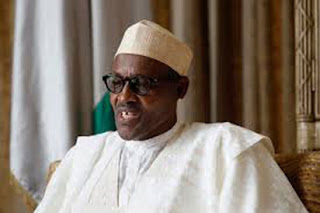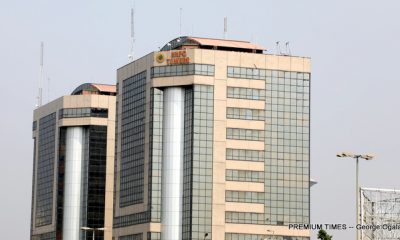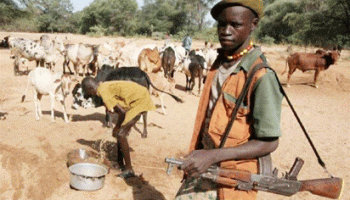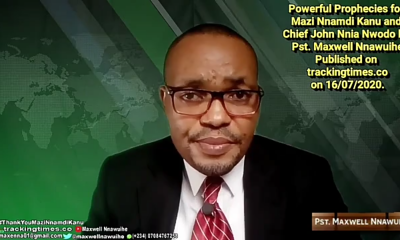Business
12m Farmers Mobilise for Buhari’s Second Term, Contribute N100 Each
12m farmers contributes N100 to support Bihari’s 2nd term bid
President Muhammadu Buhari’s return bid would receive a hefty financial boost this evening as 12 million farmers that benefited from the Central Bank of Nigeria’s Anchor Borrowers’ Programme plan a grand reception for him at the Presidential Villa, Abuja with a pledge to contribute N100 each to the president’s campaign fund, insisting that the current agricultural revolution taking place at the grassroot across Nigeria must continue.
The pledge would amount to a whooping N1.2billion and would be put together by the farmers under the auspices of Anchor Borrowers Farmers’ Association, whose membership runs across the country, particularly the North-west and the North-east.
Saying one good turn deserves another, one of the leaders of the farmers, who spoke on condition of anonymity, said they were happy with the president for his credit initiatives that had boosted their trade.
“Baba Buhari has been so good to us. So we think contributing N100 each will not be too much a way to appreciate him,” he said.
The Central Bank of Nigeria (CBN) had in line with its developmental function established the Anchor Borrowers’ Programme (ABP) and was launched by the president on November 17, 2015.
The programme is intended to create a linkage between anchor companies, involved in the processing, and small holder farmers (SHFs) of required key agricultural commodities. The programme thrust of the ABP is provision of farm inputs in kind and cash (for farm labour) to small holder farmers to boost production of these commodities, stabilize inputs supply to agro processors and address the country’s negative balance of payments on food. At harvest, the SHF supplies his/her produce to the Agro-processor (Anchor) who pays the cash equivalent to the farmer’s account.
As at August 2018, about N150 billion had been disbursed to farmers under the programme.
The farmers’ gesture would be the second of such by interest groups since Buhari declared his intention for a presidential rerun. The first was in September 2018 when a group, National Consolidation Ambassadors Network (NCAN), put together N45 million to purchase the All Progressives Congress’ presidential expression of interest and nomination forms for him.
The president had complained loudly that the amount was too much for him to raise, having borrowed N25 million in 2015 to purchase the same forms.
The group came to his rescue, generating in the process, however, a huge controversy over the legal implication of the gesture because of the limitation placed on campaign donations by the Electoral Act 2010 as amended.
Meanwhile, the president has rejected the National Assembly’s approval for refund of N488.7 billion to state governments for projects they executed on behalf of the federal government.
The president accused the lawmakers of padding the N487.852 billion promissory note he sent to the legislature for approval.
In a two-page letter dated December 10, 2018, addressed to Senate President, Dr Bukola Saraki, and read at plenary yesterday, Buhari complained that the National Assembly added N890.537million to the N487.852billion promissory note he sent to the senators for approval.
The president, who had explained that the promissory notes were meant for settlement of inherited local debts and contractual obligations on refund to state governments for projects executed on behalf of the federal government, said the federal lawmakers also reduced the number of beneficiary states from 25 to 21 despite the N890.537million added to the N487.852billion request.
According to the president, the changes made by the National Assembly in the request are not implementable due to provisions of the Public Procurement Act 2007.
He, therefore, submitted that though the federal government would not release money to any of the states removed from beneficiary list by the National Assembly but the exact monies approved by the Federal Executive Council (FEC) for the 21 other states would be paid to them regardless of whether such approvals have been tampered with or not by NASS in its own approval via a letter dated July 28, 2018.
The letter titled, “Promissory Note Programme and a Bond Issuance to settle inherited local debts and contractual obligations on refund to State Governments for Projects Executed on behalf of the Federal Government,” read in part. ” While the Federal Executive Council approved a total sum of N487,852,988,574.74 as reimbursement to state governments, the National Assembly approved N488,743,526,204.77 implying that the amount approved by National Assembly was N890,537,630.03 higher than the amount approved by FEC;
“While Federal Executive Council approved reimbursement to 25 States, National Assembly approved reimbursement to only 21 States;
“National Assembly did not approve any reimbursement for four States (Bauchi, Delta, Kogi and Taraba) whereas Federal Executive Council had approved reimbursements for them and note that, the amounts approved by the National Assembly for reimbursement to 21 states are higher than the amounts approved by Federal Executive Council for reimbursement to 25 states.
“The amount approved by National Assembly for reimbursement to each of the 21 States is higher than the amount approved by FEC for each of these States except for Adamawa, Jigawa, Kano and Niger.
“The Senate may kindly note the provisions of the Public Procurement Act, 2007, which empowers the Bureau of Public Procurement (BPP) to approve vendors and contract sums. The amounts presented to National Assembly for approval were duly certified for reimbursement by the BPP, before they were approved by the Federal Executive Council. This was after the projects had been inspected through a programme under the chairmanship of the honourable Minister, Federal Ministry of Power, Works and Housing.
“Since the BPP is charged with the responsibility of approving contract sums, and there is a need for compliance with the Public Procurement Act, 2007, I wish to request that you forward to us details relating to the amounts approved by National Assembly for the 17 States in excess of what was certified by BPP for necessary certification and approval. Furthermore, I wish to request for review of the reimbursements earlier submitted in favour of Bauchi, Delta, Kogi and Taraba States.
“Meanwhile the federal government shall proceed with implementation on the basis of where the amount approved by the National Assembly is the same as the amount approved by the Federal Executive Council: The jointly approved amount would be reimbursed. The States are: Adamawa, Jigawa, Kano and Niger;
“Where the amount approved by the National Assembly is higher than the amount approved by Federal Executive Council: The amount approved by FEC would be reimbursed. The States are: Akwa lbom, Anambra, Benue, Ebonyi, Edo, Ekiti, Enugu, Gombe, lmo, Kwara, Lagos, Ondo, Ogun, Osun, Oyo, Plateau and Zamfara.
“Finally where no amount was approved by National Assembly, no reimbursement will be made: The affected States are: Bauchi, Delta, Kogi and Taraba”.
Thisday
Business
As Nigerians Battle Pains Of Soaring Petrol Price
This is more than just about fuel; it’s about the larger picture of governance failure. The fact that a country as oil-rich as Nigeria can’t provide affordable fuel for its people is a tragedy.
BY IFEANYI MOGBOLU
The Daily Times-The latest fuel price hike in Nigeria is beyond frustrating. Every time we think it can’t get worse, it does, and yet again, ordinary Nigerians bear the brunt of it.
It’s like a never-ending cycle, where the government’s promises of reforms or stabilisation always end up as empty rhetoric. The cost of living is already sky-high, and now, with fuel prices rising again, transport fares, food prices, and basic commodities are bound to follow suit.
It’s enraging because it doesn’t feel like anyone is truly considering the everyday citizen who is struggling just to survive.
This is more than just about fuel; it’s about the larger picture of governance failure. The fact that a country as oil-rich as Nigeria can’t provide affordable fuel for its people is a tragedy. The subsidies are gone, and now we’re left in a situation where the prices of everything keep climbing, while salaries remain stagnant or non-existent for many.
The disparity between the elites and the masses is growing, and it feels like nobody in power truly cares about the suffering of the people.
READ ALSO: NNPC Lied About Pump Price, Our Fuel Is 15% Cheaper Than NNPCL’s Imported Ones — Dangote
Hardship: ‘Suspend All Policies Impoverishing Nigerians’, NASME Begs Tinubu
Naira Hits Six-month Low In Official FX Market, Prof. Steve Hanke Slams Tinubu
The anger isn’t just about fuel; it’s about the entire state of living. Nigerians are exhausted. There’s no sense of security; power supply is erratic, basic infrastructure is crumbling, and inflation is at an all-time high. How do we live like this? Every day is a battle to make ends meet, and the government seems utterly disconnected from the struggles on the ground.
It’s infuriating that while politicians and elites live in luxury, the rest of us are left scrambling for the bare minimum. The state of living is unbearable, and the lack of empathy or real action from those in power only adds salt to the wound.
There’s a deep sense of anger and betrayal that comes with seeing your country’s wealth mismanaged, while the people continue to suffer. It’s hard not to feel like we are constantly being taken for granted, pushed further into hardship without any hope of relief. Something has to give, because this state of affairs is unsustainable.
QUOTE:
The anger isn’t just about fuel; it’s about the entire state of living. Nigerians are exhausted. There’s no sense of security; power supply is erratic, basic infrastructure is crumbling, and inflation is at an all-time high. How do we live like this? Every day is a battle to make ends meet, and the government seems utterly disconnected from the struggles on the ground. It’s infuriating that while politicians and elites live in luxury, the rest of us are left scrambling for the bare minimum.
Business
Nigeria To Receive $5.600,000 From Bill Gates, For Health And Agricultural Reforms, GMOs
Alongside the activities surrounding the 79th United Nations General Assembly in New York, Vice President Kashim Shettima held a meeting with the Bill and Melinda Gates Foundation leading to the announcement of the donation by the Foundation’s head of Global Development.
Bill and Melinda Gates Foundation is giving Nigeria through Vice President Kashim Shettima, a $5.600,000 funds to speedy up health and agricultural reforms in favour of the GMOs in Nigeria, and flood relief.
Through the Foundation’s head of Global Development Programme, Dr Christopher Elias, Bill Gates pledged $5 million grant approved for Lagos Business School and partners to develop the agricultural economics they called “industrial cassava” and $600,000 for flood relief in Borno State and other health sector initiatives.
Alongside the activities surrounding the 79th United Nations General Assembly in New York, Vice President Kashim Shettima held a meeting with the Bill and Melinda Gates Foundation leading to the announcement of the donation by the Foundation’s head of Global Development.
Recall that on 4 September, Bill Gates had described the Nigeria’s economy as “stagnated” and proposed agricultural reforms for faster and increased growths in crops, fruits, vegetables amongst others to enhance nutritional values of the Nigerian citizens through the agricultural sector.
In that meeting Chaired by Vice President Kashim Shettima, Bill gates urged Nigeria to adopt “innovative crop varieties with shorter growing periods, higher yields, and better pest resistance” pointing to the GMOs to address the food crisis.
READ ALSO: Bill Gates, Anthony Fauci and conspiracy theories (part 2)
Nigeria’s economy stagnated – Bill Gates
Nigeria Is Not Meant To Exist, A Collateral Damage And British Royal Niger Corporation -Burna Boy
Moreover, at the 79th UN General Assembly in New York, VP Shettima reaffirmed to the Bill and Melinda Gates Foundation, the commitment of the administration of President Bola Ahmed Tinubu prioritizing health, nutrition, and agricultural development in Nigeria’s national agenda.
In a statement by Senior Special Assistant to the President on Media and Communications, Office of the Vice President, Stanley Nkwocha, Shettima said: “we are deeply committed to addressing the pressing developmental challenges facing our nation, particularly the significant malnutrition crisis”.
He emphasised the Federal Government’s dedication and urgently working to secure locations for maize production under the Telemaze programme.
VP Shettima, promising swift action to the Gate’s Foundation on import permits for certified seeds, the VP said, “We recognize the critical importance of food security and industrial agricultural development. The Cassava Accelerator programme, in particular, holds immense potential for our economy.
“We are pursuing a whole-of-government approach to digitisation and data exchange systems, which we believe will revolutionise our public services,” he added while reiterating the government’s focus and commitment to digital transformation.
“With the expertise” of Nigeria’s ministers, “and the continued support of partners like the Gates Foundation,” the nation remains confident in its “ability to drive meaningful change and improve the lives of all Nigerians.”
In his response, President of the Global Development Programme at the Gates Foundation, Dr. Christopher Elias, said the Foundation is burdened with worries of the severe flooding in Borno, and is “committed to supporting Nigeria in times of crisis.”
Speaking of Polio, the Foundation said, “We’re impressed by the national task force’s efforts to eliminate variant polioviruses by year-end,” Dr. Elias noted.
Also, President of Global Growth & Opportunity Division at the Bill & Melinda Gates Foundation, Rodger Voorhies, detailed plans for scaling up drought-tolerant maize production and advancing the Nigeria Cassava Investment Accelerator programme emphasizing that a $5 million grant has been approved for Lagos Business School and partners to develop the agricultural economics of industrial cassava.
In his words, “Industrial cassava presents a multi-billion-dollar opportunity for Nigeria,” Voorhees stressed.
He requested import permits for 5,000 metric tons of certified GMO maize seed to build a foundation seed system in Nigeria.
Business
Managing, Leading, Building Institutions And Sustainability
The two primary tasks of a top-level leader are to exploit and explore the organisation with people for now and in the future.
By Babs Olugbemi
One of my concerns for leaders is their capacity to be ambidextrous. Regardless of years of experience, knowledge, and leadership capacity, the lack of a clear distinction between managing and leading on the one hand, leading and building institutions on the second layer, and ultimately focussing on sustainability is a significant threat to successful leadership change.
I have followed events and people at C-suites, coached some, and developed frameworks for leadership development. Based on the personalities and styles of the new leaders, I have confirmed my fears about leadership sustainability in most African organisations.
“Successful leaders can aptly differentiate themselves and their roles without necessarily seeing activities as performance, focussing on what is required of them with appropriate tenacity and influence.”
The challenge for leaders is how to lead for the present and future without losing sight of the stakeholders’ immediate performance expectations. Successful leaders can aptly differentiate themselves and their roles without necessarily seeing activities as performance, focussing on what is required of them with appropriate tenacity and influence.
READ ALSO: Leadership, not God responsible for Africa’s poverty
Afrocentric colonialism: The new face of African oppression
Health: Genotype And Compatibility, Phenotype, Blood Groups And DNA
In my walk as a leadership coach, I have keenly observed leaders who are managing rather than leading. Managing involves ensuring that processes achieve their intended outcomes. Leaders are above managing and should focus on creating an enabling environment for innovation, inventions, and team collaboration. The primary role in leading is not to monitor process outcomes, though critical to the company’s overall objectives, but to align corporate values with the people’s aspirations to create an engaged and ownership-thinking mindset ready to take on challenges and explore opportunities. An alignment of corporate and personal goals will not only deliver the present performance expectations. Still, it will also incubate innovations to adapt to future market demands and the sustainability of the business.
Unfortunately, the capacity for ambidexterity is rare and often marked by leaders’ exposure, approach and styles, perception, and perspective of their roles in the organisation. A leader with a wrong foundation in these areas is set for failure and awaits unfavourable decisions from the board of directors. A top-level leader might manage their teams instead of leading them. Not all leaders can combine leading for the present with building institutions. However, anyone able to submit themselves to an institution-building mechanism can champion sustainability. Aside from being a leadership coach, I help leaders achieve sustainability.
Mathematically, creating an ambidextrous organisation is beyond leading. It is to lead and build an institution that focuses on sustainability in all aspects of the organisation—employee fulfilment, customer retention, strategy effectiveness, performance evaluation, stakeholder management, process improvement, and goal congruence.
In a nutshell, the role of successful leaders in ambidextrous organisations is striking a balance between exploiting current assets and capabilities to ensure short-term success and allocating enough energy and resources to exploration to ensure future viability. The two primary tasks of a top-level leader are to exploit and explore the organisation with people for now and in the future. The two seemingly contradictory aspects—exploitation and exploration—encompass different strategies and processes and have different targets and outcomes (March 1991; O’Reilly & Tushman, 2004; O’Reilly & Tushman, 2013).
O’Reilly and Tushman described the two concepts as follows:
- Exploiting: Exploiting involves building on an organisation’s achievements and maximising returns on previous investments. It focuses on responding to current business demands to remain efficient and competitive within an established market niche, as well as on maintaining an existing customer base and stakeholder relationships. Examples of exploiting are activities focused on continuous improvement, benchmarking, and redesigning business processes.
- Exploring: Exploring focuses on expanding an organisation’s knowledge and capabilities, pioneering new products and services, and discovering and venturing into untapped markets.
The common area of practical bottlenecks in exploiting and exploring in organisations is a need for foundational trust and cohesion among the resources, especially the human capital, which are often treated as costs rather than assets to the organisations. Among all the factors of production, only humans can be ambidextrous with the capacity to think about changes in economic parameters and adjust their behaviours to match the time, content, and contextual requirements.
While organisations might have the resources to deploy in fighting competition, technology to obtain first-mover advantages, and production capacity to maximise output from input, none is compared with the potential of an engaged workforce.
Therefore, for leaders to be successful, they must refrain from operating in the realm of managing. They should operate in the capacity of institution builders, with the mindset of creating sustainable leadership and growth with people first and other factors of production second.
Consequently, only the leaders who prioritise their people over profits, pride, and organisational arrogance will be successful in the long term.
-

 News5 years ago
News5 years ago$800m oil fraud: resign as Petroleum Minister – Frank tells Buhari, asks for probe
-

 Biafra5 years ago
Biafra5 years agoPROPHECY: Powerful Prophecies for Mazi Nnamdi Kanu and Chief John Nnia Nwodo by Pst. Maxwell Nnawuihe (Text & Video)
-

 Biafra5 years ago
Biafra5 years agoBREAKING: Dragon Flag Can’t Come Down, You Must Allow Our Brave Men To Do Their Job – Nnamdi Kanu
-

 Business8 years ago
Business8 years agoNEWS PAPER HEADLINES FOR TODAY THURSDAY 28 SEPT 2017
-

 Business4 years ago
Business4 years agoFUEL: PPPRA removes new petrol price post as NNPC insists no hike
-

 Business7 years ago
Business7 years agoSuspected Fulani militia kill two in fresh Taraba attacks
-

 Biafra5 years ago
Biafra5 years agoVIDEO: Powerful Prophecies for Mazi Nnamdi Kanu and Chief John Nnia Nwodo by Pastor Maxwell Nnawuihe
-

 News6 years ago
News6 years agoA fatal accident along Benin/Auchi express way has claimed the lives of an entire family while traveling for Christmas.